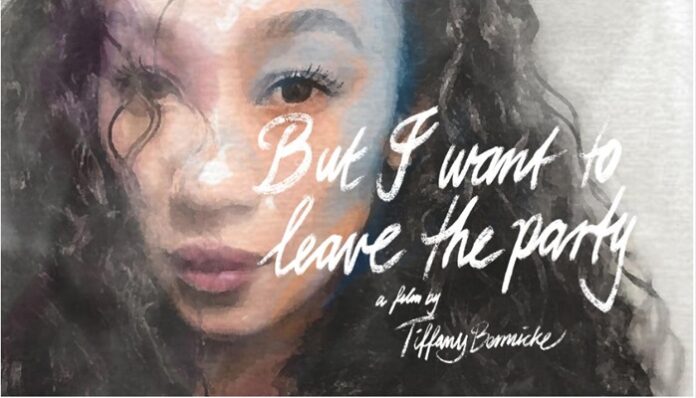
At only 14 minutes long, “But I Want to Leave The Party” packs a powerful punch. This film explores a young woman trying to find herself after experiencing several forms of trauma and abuse. The film combines beautiful imagery, metaphors, and an in-depth look at how crippling and all-consuming depression and the aftermath of traumatic events can be. Without ruining the film by providing too much detail, I will leave it to say I feel it is an important piece for all to watch. Whether you have experienced similar emotions or you know someone who has, there is a deeper understanding one can receive from this film.
I had the pleasure of interviewing film producer and star, Tiffany Lauren Bennicke, about the creative process and intent behind her short film. Read below for more on her process and what the film meant to her.
Where did you find inspiration for the film?
As far as inspiration goes, there were two sides to it: Inspiration for the story told, and inspiration to make a film – this is the very first film I’ve made.
I’ll start with the latter. I get asked this question often at the film festivals.
Before producing or writing, I’ve been an actress first, and it’s no mystery that the entertainment industry can be cut-throat, difficult to break into, disheartening, discouraging, and dispiriting. For every actor you can think of, there are hundreds if not thousands more who experience working hard for years without so much as booking anything significant. I’d come to a point where I was tired of waiting for someone else to hire me. So I wrote, produced, financed, and acted in my first short film. At the time of this interview, the film has now won 16 awards with an additional 25 nominations.
And as for the story, well, I wrote the script in two days – this is not commonplace. But as far as time to write it, it was only “easy”, as it was an ambiguous retelling of my own experiences with depression and my own declining mental health a few years ago. It was very important to me from the beginning that this film be honest – above all else, I wanted it to feel authentic, because when talking about sensitive topics like this, you want to be careful to not be offensive to anyone who has personally experienced depression, or is presently going through something difficult.
What is your goal with viewers seeing this short film?
I hope to bring further awareness and a deeper understanding of what it’s like to go through this. Whether or not someone connects with my film, I hope that it at least gives an honest perspective of what it’s like to struggle with depression and declining mental health, an experience that so many are familiar with, that isn’t always easy to articulate.
What do you think is one small actionable item someone who is going through this can task themselves with?
Oh, that’s a tricky one…Especially coming from myself, because I don’t like telling anyone what to do. In my experience, people will ultimately do what they want to do regardless of any advice or suggestions given. And I understand this because I am one of these people. Also, every person’s experience is so different, and every life so unique, that I don’t feel as if there’s one cookie-cutter response that would help everyone. All I can do is share my own experience, and hope that maybe I inspire someone else.
I detested the idea of going to therapy. I resolutely did not want to do it. When presented with the idea, I declined for weeks, and when I couldn’t avoid that anymore, I’d try to find reasons to cancel, I’d schedule other things at the same time and date, forcing me to cancel. When I finally did end up going to my sessions, I’d cry the entire way there, and let’s just say I was not an easy patient to talk to. It personally took me six months of going to therapy sessions, before I started talking to my therapist.
Thankfully, I have a very patient therapist, and very, very slowly, I started to see things change in my life and within myself. It was a good decision to do it. But I was too far gone at the beginning to see how it would benefit me in any way. I would just say that when someone decides to go to therapy, to do the work of finding a well-reviewed therapist. Therapy helped me, I know it could help others, but again, I don’t like to tell others what to do. But I hope I’ve inspired someone to try it.
If you’re willing to share, was this film based on true experiences, and if so, how are you coping nowadays?
The film is loosely based on personal experiences. It was easy to recount things quickly, but difficult to relive them when writing, and of course allow myself to recreate them while filming. I cried on every single take – it was hell. For one full week after filming, my eyes were swollen and I had a headache that did not respond to any medication. It was cathartic, but not easy.
I’m still in therapy and may be for a long time, but I’m better able to deal with things that would have distressed me years ago.
How do you feel about mental health stigmas as well as access to resources (or lack thereof) affect those with mental health concerns?
More recently, I’ve seen increased awareness surrounding mental health, which is fantastic, but we still have a very long way to go. Much like many other problems we see in society right now, if one individual is suffering or enduring something unpleasant and another is not, it’s hard for the one who isn’t to empathize with the one who is.
“It’s happening to them not me” or, “It’s happening in that country so far away, not mine” – I think it would do us magnitudes of good for a multitude of problems, (mental health and beyond) if empathy were taught and developed at a very young age.
As far as resources go, we are lacking. It was not that long ago that during the pandemic, therapists were stretched thin with an overwhelming number of new clients. With increasing awareness of declining mental health and solutions, we will only need more resources soon – better yet, yesterday.
Where can people watch your short film?
The film is available on Apple TV and Google Play.
What next projects do you have planned?
There’s a lot on the horizon – films and TV series are both in the wings and in their earliest stages of development.
If you get a chance to watch the film, we would love to know your opinion in the comments below. As we always mention during pieces focusing on mental health, you are not alone. If you need immediate assistance, call 988 or a local mental health hotline to talk to a trained professional.
Featured image via Apple TV Cover Photo


















